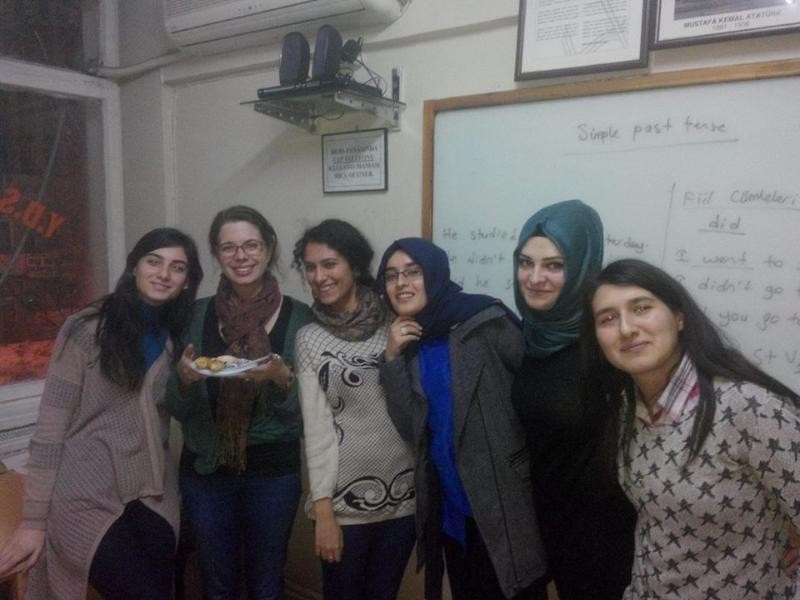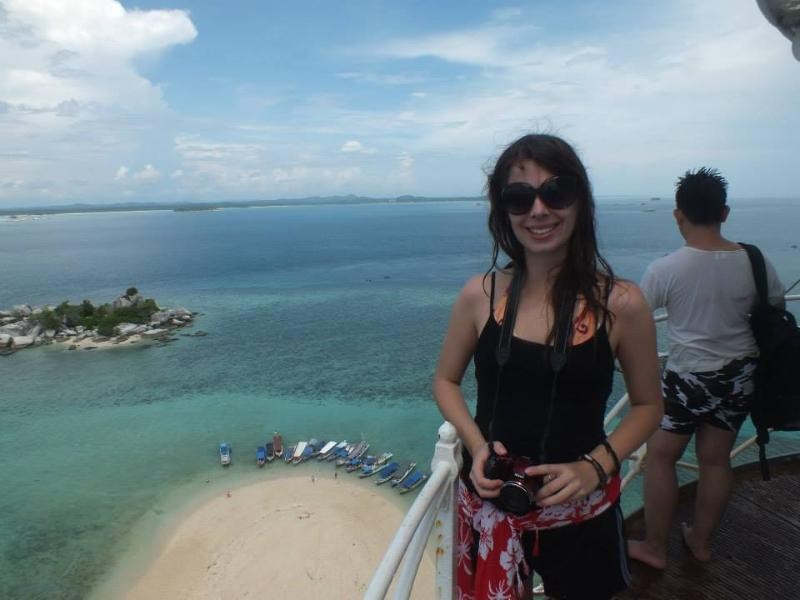CERTIFICATE IN TESL LINGUISTICS - ALUMNI PROFILE
Jordan Delville-Pratt
Meet people from various cultural backgrounds while traveling and teaching English
Jordan Delville-Pratt was born and raised in Coquitlam, BC. During a gap year between high school and university, Jordan traveled Europe and spent six months in Albania, where she became infatuated with language and communication. While living in a small town with mostly Albanians and some expats, Jordan experienced the frustrations and communication breakdowns that come with living in a dual language environment. So in her spare time she studied the language and fell in love with the grammar, vocabulary, and the different ways that sentences could be put together, all of which deepened her understanding of the people and culture.
Jordan wanted to continue traveling, learning, and meeting people, so she decided to study Linguistics at SFU and complete the Certificate in TESL Linguistics with a plan of teaching English abroad after graduation. Jordan graduated from SFU with a BA in Linguistics and a Certificate in TESL Linguistics in 2012; here she reflects on her time at SFU and her experiences teaching abroad and returning home.
How has the study of linguistics shaped your world view?
I first realized how linguistics was shaping my perceptions while I was studying the Latin and Greek origins of words in LING 100. I learned how some words have lost their original purpose, but psychologically speaking, even though we aren't consciously aware of this, these words still mean what they were intended to mean. We use language as a tool without completely understanding the immense power of words – words have impact!
Memorable moments from your time at SFU?
Though I love grammar, LING 200 was probably one of the hardest classes I took during my degree! I love sociolinguistics and had tonnes of fun writing a term paper on the linguistic stylings of beat poets at the Commercial Drive poetry slam. I also enjoyed my LING practicum courses, particularly the teaching experiences. For LING 363 I did my practicum at the Burnaby English Language Centre (BELC) and I remember it being very intimidating and overwhelming at first. Dr. Cliff Burgess, an excellent professor and a very relatable person, supervised my practicum; he pushed me to do more than I believed I was capable of and his support and encouragement had a profound effect on the way I applied myself to lesson planning and teaching.
During my degree I also did the Explore program (which I highly recommend). I traveled to Quebec, was immersed in the French language, and worked in a museum. This experience gave me far more empathy for my ESL students when I was teaching overseas because I remembered being in an immersion situation and the frustrations of not being able to fully express myself.
What did you do following graduation?
Having my certificate in TESL gave me many opportunities for travel. After graduation I applied for overseas jobs and took the first teaching job I was offered at a school called English First (EF) in Jakarta, Indonesia. I only roughly knew where that could be found on a map, but I was going!
My first eye-opener to TESL teaching was that teaching English is a business in many places, and the branch of EF that I worked for was owned by a local family and was run for-profit. At EF, I really enjoyed the variety in my job; I taught all levels, beginner to advanced, children and adults. It was a really good place to learn how to teach ESL. Then an opportunity arose for me to teach at a Japanese school in South Jakarta. This was a school for children of Japanese families living in Jakarta, with Japanese curriculum taught in Japanese by Japanese teachers. The children in this school learn English much like children in Canada learn French, and I was their English teacher. I was paid well, had regular hours, and had the opportunity to learn so much about Japanese culture. Over time, however, I found Jakarta to be a taxing city to live in – vibrant and multicultural, but busy, crowded, and polluted – and when the opportunity arose, I moved to a city in south-eastern Turkey called Malatya. A far smaller city in a very conservative part of the world, I had only one other English speaker to befriend and taught “spoken English” to all ages and all levels of English learners.


I learned so much teaching overseas. I learned from the teachers around me – some of whom were excellent and some of whom were not; I learned equally from both. I learned what worked in the classroom and what didn’t work in the classroom. I love grammar and it was awesome to have the opportunity to teach it and be passionate about it, which I attribute to earning my degree in Linguistics.
There were so many memorable and rewarding experiences. So many people, so many stories. So much I didn’t know. Overseas life can get quite colourful at times! Teaching abroad gave me the opportunity to travel, and ESL teachers are an interesting bunch – another eye opener!
Any advice to students who want to teach overseas?
I had intended to move to Kazakhstan and continue teaching, but had trouble with the visa process and ended up back in Vancouver, teaching at a language school downtown. I hadn’t made concrete plans for post-overseas life and I experienced a lot of culture shock. It was far harder returning home than it had been leaving! I caution all who want to work overseas to have a coming-home plan, and be aware of the psychological ramifications of returning.
What’s next for you?
I am working as a Development Officer in the Business Development Department in the Surrey School District, overseeing all donations and funds for the 31 inner city schools in the district. I enjoy my work and I still love to travel. I went to southern Africa this past summer and did a self-drive safari with my sister and her husband, and I intend on traveling more. I miss it more than I can say!



